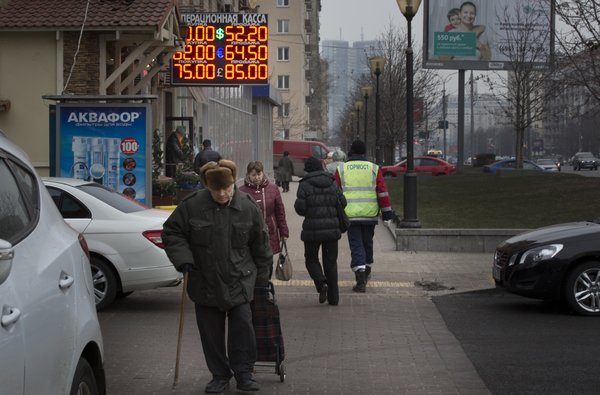(单词翻译:单击)
MOSCOW — After months of insisting that Russia can weather sanctions and plunging oil prices, Moscow for the first time is acknowledging that the economy could fall into a recession next year.
莫斯科——几个月来,俄罗斯一直坚称自己能够经受住制裁和油价的急速下跌,但现在,莫斯科方面首次承认,该国经济明年可能会陷入衰退。

The Ministry of Economic Development, which publishes the government’s economic outlook, on Tuesday revised its forecast for 2015 to show a contraction of 0.8 percent, compared with a previous projection of 1.2 percent growth.
周二,负责发布官方经济展望的经济发展部(The Ministry of Economic Development)修改了预测数字,称俄罗斯经济将于2015年萎缩0.8%,而不是之前预计的增长1.2%。
The combination of sanctions and plummeting oil prices is catching up with Russia’s economy, wobbly in the best of times because of its heavy reliance on commodity exports.
制裁和油价猛跌同时作用,正在对俄罗斯经济造成不利影响。由于严重依赖大宗商品出口,俄罗斯经济在最好的时候陷入了摇摇欲坠的状态。
In the face of the weakness, the ruble has been in a free fall, driven by Russians’ fears of economic isolation and their eagerness to change rubles into dollars or euros to move wealth out of the country.
面对着经济走软的局面,俄罗斯人担心遭到孤立,急于将卢布换成美元或欧元,以便将财产转移到海外。此举致使卢布大幅贬值。
The ruble opened at 52 to the dollar and slipped to around 53 in trading on Tuesday. So far this year, the ruble has fallen more than 40 percent against the dollar.
周二,外汇市场以52卢布兑1美元开盘,以大约53卢布兑1美元收盘。今年到目前为止,卢布对美元的汇率已下跌逾40%。
Also boding ill for the Russian economy was the announcement on Monday by President Vladimir V. Putin that he would scrap plans for South Stream gas pipeline. The project, once intended to establish the country’s energy dominance in southeastern Europe, fell victim to Russia’s increasingly strained relationship with the West.
俄罗斯总统弗拉基米尔·V·普京(Vladimir V. Putin)周一宣布,将废除“南线”(South Stream)天然气管道项目。这对俄罗斯经济来说也是一个坏消息。该项目原本意在让俄罗斯确立在欧洲东南部的能源主导地位,但最终成为其与西方关系紧张的牺牲品。
More policies shifts could follow. The Russian economy has a history of making hairpin turns from growth to sharp decline, imposing sudden and wide-ranging limitations on the country’s foreign and domestic politics.
接下来或许会出现更多的政策转变。俄罗斯经济拥有急剧变化的前科,频频从增长掉到大幅下滑,导致该国的对外及对内政策突然受到广泛的钳制。
The economic woes show little signs of easing anytime soon.
目前的经济困境没有显示出多少将会很快缓解的迹象。
Western sanctions over Russia’s annexation of the Crimean Peninsula and backing of rebel groups in eastern Ukraine have crippled Russian banks by restricting them to short-term credit.
因为俄罗斯吞并克里米亚半岛、支持乌克兰东部的叛乱组织,西方对其施加了制裁。这种制裁令俄罗斯银行仅能获得短期贷款,使得它们遭到重创。
The weakness in oil prices, now around $72 a barrel, is complicating matters. Oil and natural gas make up about 60 percent of Russia’s export earnings.
油价走低则让情况变得更加复杂。眼下,油价将至每桶72美元左右(约合440元人民币),而石油和天然气在俄罗斯的出口收益中占了大概60%。
In another worrying sign, Russians have been bulking up on consumer items as the ruble depreciates, converting savings into durable goods lest their savings become worthless. Appliance stores in Moscow have had runs on refrigerators, washing machines and televisions. It is a pattern seen before previous ruble crashes, indicating evaporating faith in the currency.
还有一个令人担心的迹象:随着卢布的贬值,俄罗斯人开始囤积消费品,拿出储蓄来购买耐用品,以免积蓄变得一文不值。莫斯科的电器商店出现了哄抢冰箱、洗衣机和电视的现象。之前卢布汇率暴跌时出现过这种情况,说明人们正在对卢布迅速失去信心。
“I expect inflation to go to double digits early next year,” said Vladimir Tikhomirov, chief economist at BCS Financial Group.
BCS金融集团(BCS Financial Group)的首席经济师弗拉基米尔·蒂霍米罗夫(Vladimir Tikhomirov)说,“我认为,明年年初,通货膨胀率将达到两位数。”
“The only reason people haven’t started changing their savings into currency in larger amounts is because it happened so fast,” he added. “It caught them off guard.”
“人们之所以还没有开始把储蓄大量转化为外汇,唯一的原因是,一切发生得太快,”他还说。“让他们猝不及防。”
Russia’s state finances appear solid for now. The depreciation of the ruble has raised tax income from commodity exports priced in dollars, like oil.
目前,俄罗斯的国家财政状况似乎依然稳定。卢布的贬值,增加了来自石油等用美元计价的大宗出口商品的税收。
And the central bank and two sovereign wealth funds hold billions, giving the country a decent cushion. Still, economists argue that the headline numbers exaggerate somewhat the amount available to prop up the ruble or bail out companies, as the money is already committed to long-term investments in Russia.
此外,俄罗斯央行和两个主权财富基金手握大笔资金,可以给经济提供一个很好的缓冲。不过,经济学家们认为,这些大事宣扬的数据夸大了可以用来支撑卢布或者援助企业的金额,因为这笔钱已经承诺在了俄罗斯的长期投资上。
The deteriorating economy also puts Mr. Putin in a difficult spot.
不断恶化的经济状况也让普京陷入了困境。
He has presided over more than a decade marked largely by an expanding economy and rising inflation-adjusted wages. Now that record is coming to a close.
在他当政的十多年里,俄罗斯经济持续扩张,经通胀调整后的工资水平也在不断上涨。如今,这种局面即将结束。
Mr. Putin did not address the projected economic decline publicly on Tuesday, and ministers disagreed on the severity of the problems.
周二,普京没有公开提及预测中的经济衰退,几名内阁部长也在问题的严重性上产生了分歧。
Aleksey Vedev, the deputy minister of economic development, told reporters that “the Russian economy is harmed by three forms of crisis or elements of instability: structural, speculative and geopolitical risks,” according to Tass, the state-run news agency. “So in my view it is a little simplistic to assert that the Russian economy lowers its rate of growth or goes into the negative only due to oil prices.”
俄罗斯官方媒体塔斯社(Tass)报道,经济发展部副部长阿列克谢·韦杰夫(Aleksey Vedev)告诉记者,“三种形式的危机或不稳定因素正在对俄罗斯经济造成损害:结构、投机和地缘政治方面的风险。所以在我看来,如果把俄罗斯经济的增长率降低或发生衰退仅仅归咎于油价问题的话,有些过分简单化。”
Anton Siluanov, the Russian finance minister, called the report a “preliminary assessment,” and said it had not been approved by the entire cabinet. The Ministry of Finance and Ministry of Economic Development often release competing and contradictory economic data.
俄罗斯财长安东·西卢阿诺夫(Anton Siluanov)则称这一预测是“初步估算”,并表示它并未得到整个内阁的认可。财政部(Ministry of Finance)和经济发展部常常会发布一些相互矛盾的经济数据。
Mr. Siluanov also argued that the ruble was now undervalued after its long slide. He said the ruble might stabilize next year at 45 to the dollar, stronger than the economy ministry’s estimate on Tuesday of an average ruble-dollar exchange rate of 49 in 2015.
西卢阿诺夫还认为,经过长时间的下滑,卢布目前的币值偏低。他表示,明年,汇率可能会稳定在45卢布兑换1美元。这一预测要强于经济发展部周二估计的2015年平均汇率,即49卢布兑换1美元。


